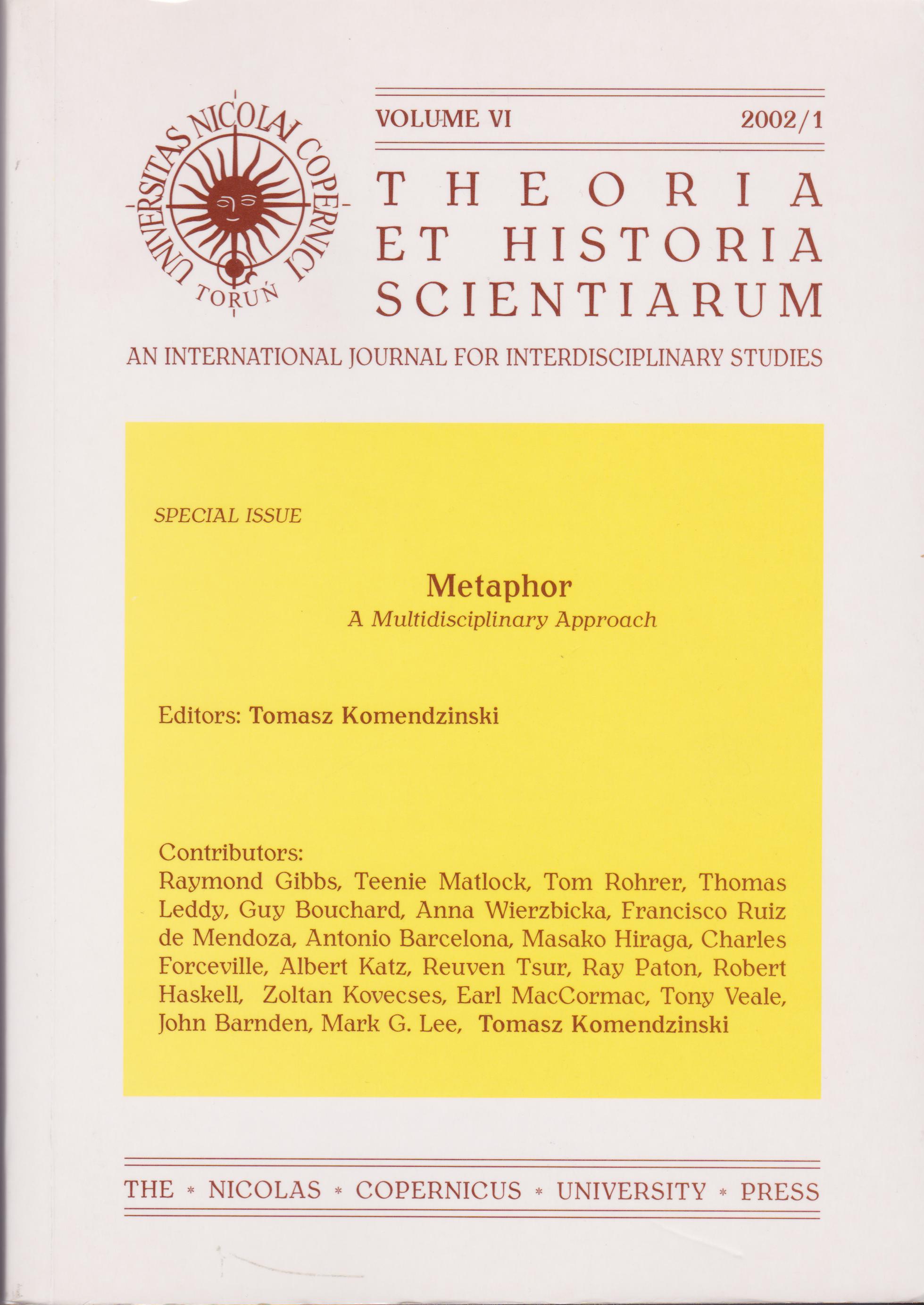Some Comments on the Lakoffean Conception of Spatial Imagery
DOI:
https://doi.org/10.12775/ths.2002.011Keywords
Lakoffean Conception, Spatial ImageryAbstract
The following comments grew out from two accidental encounters I had in one week with approaches to literature that involve the cognitive-linguistics oriented work developed by Lakoff, Johnson, Turner, Fauconnier and others. Significantly enough, in both instances I faced groups of scholars who presumed to speak in the name of “Literature and Cognitive Science”, while handling merely a small area of the field. A spokesman for one of the groups made a few very intelligent and penetrating comments from the point of view of the Lakoff approach on my paper “Aspects of Cognitive Poetics”, among them the following:Your paper implies criticism of their work at several points: their redefinition of metaphor as a conceptual rather than a linguistic function, their in-attention to the affective responses elicited by poetry, and their preoccupation with spatial imagery, among others.
Since that paper opens only a small window into my work, I thought I’d better clarify two points with reference to these comments concerning the "redefinition of metaphor”, and the “preoccupation with spatial imagery”. Parts of this analysis were written for this specific answer; but considerable parts were just copied and pasted with the necessary changes from earlier publications of mine.
References
Brown, Roger (1968) Words and Things. New York: The Free Press.
Burke, Kenneth (1962) A Grammar of Motives and A Rhetoric of Motives (in one volume). Cleveland & New York: Meridian Books.
Clark, Herbert H. & Eve V. Clark (1977) Psychology and Language: An Introduction to Psycholinguistics. New York: Harcourt, Brace & Jovanovich.
Eco, Umberto (1976) A Theory of Semiotics. Bloomington: Indiana UP.
Freeman. Margaret H. (in press) “Poetry and the scope of metaphor: Toward a cognitive theory of literature”. To appear in Metaphor & Metonymy at the Crossroads. Ed. Antonio Barcelona, Mouton de Gruyter 1998.
Gardner, Howard (1982) Art, Mind, & Brain. New York: Basic Books.
Gibbs, Ray (1997) “Conceptual Metaphors Underlying Conventional and Poetic Language”, paper presented at the “Cognitive Theories of Intertextuality” research workshop at the Porter Institute for Poetics and Semiotics, Tel Aviv University: December 30, 11997 - January 1, 1998.
Johnson. M. (1987). The Body in the Mind: The Bodily Basis of Meaning, Imagination, and Reason. Chicago: Chicago University Press.
Kris, Ernst, and E. H. Gombrich (1965) “The Principles of Caricature”, in Ernst Kris Psychoanalytic Explorations in Art. New York: Schocken.
Lakoff, George (1993) “The Contemporary Theory of Metaphor”, in Andrew Ortony (ed.,) Thought and Metaphor. Cambridge: Cambridge UP (second ed.). 202-251.
Miall, David S. (1997) “The Body in Literature: Mark Johnson, Metaphor, and Feeling”. Journal of Literary Semantics, 26 (3), 191-210.
Neisser, Ulric (1968 [ 1963'] “The Multiplicity of Thought”, in P. C. Wason and P. Johnson- Laird (eds.), Thinking and Reasoning. Harmondsworth: Penguin. 307-323.
Neisser, Ulric (1976) Cognition and Reality. San Francisco: Freeman.
Ornstein, Robert E. (1975) The Psychchology of Consciousness. Harmondsworth: Penguin. Polanyi, Michael (1967) The Tacit Dimension. Garden City, N.Y.: Anchor.
Shklovsky, Victor (1965) “Art as Technique”, in L. T. Lemon and M. J. Reis (eds.), Russsian Formalist Criticism. Lincoln: Nebraska UP. 3-24.
Smart, J. J. C. (1966) “Theory Construction”, in A. G. N. Flew (ed.), Logic and Language. Oxford: Blackwell. 222-242.
Thomson, Philip (1972) The Grotesque. London: Methuen.
Tsur, Reuven (1987). On Metaphoring. Jerusalem: Israel Science Publishers.
Tsur, Reuven (1992a). What Makes Sound Patterns Expressive - The Poetic Mode of Speech Perception.
Tsur, Reuven (1992b). Toward a Theory of Cognitive Poetics. Amsterdam: Elsevier (North Holland) Science Publishers. Tsur, Reuven “Aspects of Cognitive Poetics”.
Ullmann. Stephen (1957) “Panchronistic Tendencies in Synaesthesia”, in The Principles of Semantics. Oxford: Blackwell. 266-289.
Downloads
Published
How to Cite
Issue
Section
Stats
Number of views and downloads: 288
Number of citations: 0



